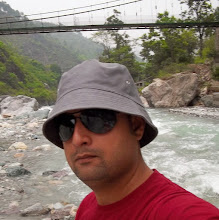In “When A Crocodile Eats The Sun”, Peter Godwin weaves the deeply personal and the political together
through his gripping narrative in this work of non-fiction set in his beloved
Zimbabwe.
The Zimbabwe of his childhood is
gradually falling apart, the Whites are no longer welcome, many have left as a
result, yet him and several others like him can’t sever the umbilical cord. He
keeps longing for Africa despite having settled in New York with partner and
kids.
He oscillates between a
journalist and a memoirist. As a journalist he is very objective when writing
about the deteriorating political situation in Zimbabwe. For example, he gives
a balanced view of why the situation has turned sour for the Whites
post-Independence. The Whites controlled 50% of the land in colonial times when
they made up just a miniscule 1% of the population. He sheds light on why race
is a potent political weapon in Africa. However, as a son and a White, one can
clearly make out his despondency and despair when writing about his family
history and elderly parents in Harare. His remembrance of his dead elder sister
Jain makes for pensive reading.
As he grapples on several fronts,
he never expected a dark secret to stumble out of the family closet. That his
father, who he had known to be English all his life, was actually a Polish Jew
from Warsaw. George Godwin had kept it a secret from his children on purpose.
Peter learns of his father’s Jewish birth name from his mother, Helen. He
maintains as much of a measured tone as possible as he delves deeper into the
paternal side of his family and what they had to endure due to Holocaust,
something that haunted his father till his last. For example, George Godwin
could never get over that his mother and younger sister perished in a
concentration camp. That at the age of 10, he was separated from his father
Mauricy (author’s paternal grandfather) and they never met again and kept in
touch only through letters. The details are heart-wrenching.
Despite the measured tone, the
reader can sense Peter’s deep admiration for what his father George went
through, all of 10, stranded alone in England, cut off from his Polish family on
account of World War II.
One gets a good account of the
author’s true blue African blood when he shares intricate details of Zimbabwean and
African customs. For example, why the Zulu tribe bury their dead under the Aloe
tree. That the docile looking Hippopotamus kills more people than any other
mammal. Another one, the Dande tribe inhabiting the Zambezi valley follow a
strict hierarchy when fetching water from rivers etc. There are plenty more. Only someone born and
raised in Africa would know and understand those peculiarities. No wonder
Georgina, his London based younger sister, laments to him that their children
will never know Africa the way the siblings did.
Although the title of the book
“When a crocodile eats the sun “is taken from the Zulu tribal expression of the
solar eclipse, it can be interpreted in the political context of Zimbabwe as
well. The readers can very well make out who the crocodile and sun are.
Surprisingly, it is not just the White Zimbabweans who have been at the
receiving end, Black Zimbabweans have suffered as much due to the
deteriorating situation. For instance, amendment to the farm ownership rules
left thousands of black farm workers unemployed. Blacks who supported the
Opposition were termed “mwengi” which means enemy and subjected to political violence.
With regards to his narrative
style, the author takes an analytical-viewpoint approach to the political
situation and a descriptive-non-linear one for the family history. And,
borrowing from fiction perhaps, Peter Godwin manages to insert a twist in the
tale as well towards the end with regards to his father’s last rites borne out of
necessity and in deference to the latter’s last wish.
The Godwins may have left
Zimbabwe for good with George having passed away, Helen with Georgina in London and Peter in New York, yet the umbilical cord remains unbroken for the eldest
sister Jain lays buried in Harare, Zimbabwe.
This book is very much
recommended to those who wish to understand the uniqueness, complexities and
contradictions that is Africa from a White African’s perspective.





0 Comments